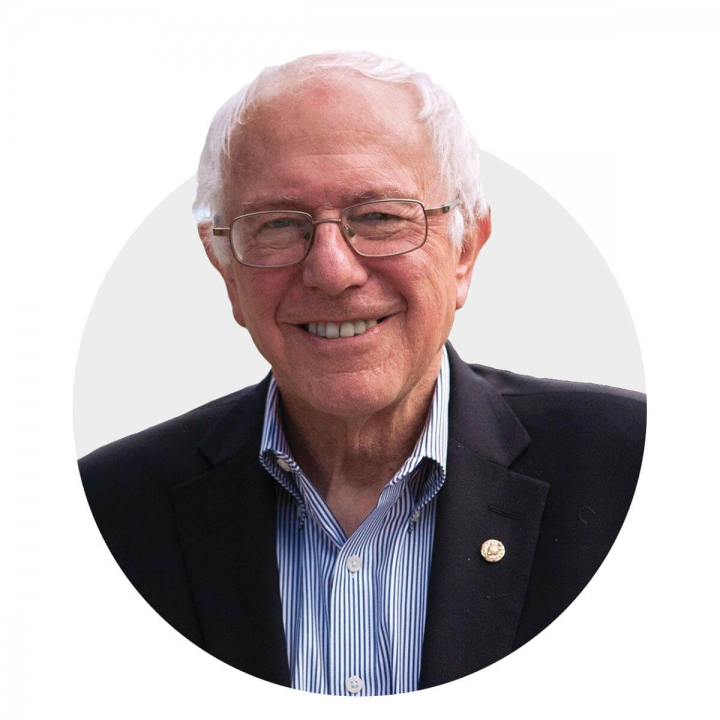Bernie Sanders on Criminal Justice Reform
Sanders co-sponsored the "Recidivism Reduction and Second Chance Act of 2007
Sanders voted in favor of the 1994 crime bill authored by Joe Biden. He has since stated that this was due to specific provisions in the bill which he favored, including the Violence Against Women Act and a 10-year assault weapons ban. At the time, Sanders stated, “I have a number of serious problems with the Crime Bill, but one part of it that I vigorously support is the Violence Against Women Act. We urgently need the $1.8 billion in this bill to combat the epidemic of violence against women on the streets and in the homes of America.”
Sanders voted for an amendment to the 1994 crime bill to ban the federal death penalty.
Sanders would legalize marijuana and vacate and expunge past marijuana convictions.
Sanders would raise the threshold for when drug charges are federalized, as federal charges carry longer sentences.
Sanders would ban for-profit prisons.
Sanders would incentivize states and localities to end police departments’ reliance on fines and fees for revenue.
Sanders promises to “stop excessive sentencing with the goal of cutting the incarcerated population in half.”
Sanders would reverse the Trump administration’s guidance on the use of death penalty drugs with the goal of ending the death penalty at the state level.
Sanders would abolish the death penalty.
Sanders would end cash bail.
Sanders would end “three strikes” laws.
Sanders would expand the use of sentencing alternatives, including community supervision and publicly funded halfway houses. This includes funding state-based pilot programs to establish alternatives to incarceration, including models based on restorative justice and free access to treatment and social services.
Sanders would make expungement broadly available.
Sanders would remove legal and regulatory barriers and facilitate access to services for people returning home from jail or prison.
Sanders would create a federal agency responsible for monitoring re-entry.
Sanders would enact fair chance licensing reform to remove unfair restrictions on occupational licensure based on criminal history.
Sanders would guarantee jobs and free job training at trade schools and apprenticeship programs for people leaving jail or prison.
Sanders would decriminalize truancy for all youth and their parents.
Sanders would end solitary confinement for youth.
Sanders would fund states and municipalities to create civilian corps of unarmed first responders for low-level incidents.
Sanders would ban the prosecution of children under the age of 18 in adult courts.
Sanders would triple congressional spending on indigent defense, to $14 billion annually.
Sanders voted against the 1991 crime bill stating, “This is not a crime prevention bill. This is a punishment bill, a retribution bill, a vengeance bill.”
Sanders voted in favor of at least one amendment to the 1994 crime bill to allocate 10.5 billion more in grants to states for prison construction. The Sanders campaign has said this was in an effort to “strip out” other language which would have expanded the crimes for which individuals could be sentenced.
Sanders supported the Smarter Sentencing Act of 2014, which would have adjusted federal mandatory sentencing guidelines for a number of crimes in an effort to reduce the size of the current U.S. prison population. Namely, it would have reduced mandatory sentences for drug offenses, would have expanded the ability of non-violent offenders to reduce their sentences, and would have enabled federal prisoners to seek retroactive sentence adjustment under the Fair Sentencing Act of 2010.
Sanders would institute a full review of the current sentencing guidelines and end the sentencing disparity between crack and cocaine.
Sanders supports removing questions regarding conviction histories from job and other applications.
Sanders would minimize costs for incarcerated individuals by making prison phone calls and other communications free, and would audit the practices of commissaries.
Sanders would ensure that diversion, community supervision, or treatment programs are free.
Sanders would end mandatory sentencing minimums.
Sanders promises to improve law enforcement accountability by banning the use of facial recognition software for policing; conducting a U.S. Attorney General’s investigation whenever someone is killed in police custody; establish a federal no-call policy; mandating criminal liability for civil rights violations resulting from police misconduct; creating federal standards for the use of body cameras; providing grants for cities and states to establish civilian oversight agencies; creating a federal database of police use of deadly force; ending federal programs that provide military equipment to local police forces; rescinding former Attorney General Jeff Sessions’ guidance on consent decrees; and revitalizing the use of DOJ investigations, consent decrees, and federal lawsuits to address systemic constitutional violations by police departments.
Sanders would reinstate a federal parole system and end truth-in-sentencing. People serving long sentences will undergo a “second look” process to make sure their sentence is still appropriate.
Sanders would “invigorate and expand” the compassionate release process so that people with disabilities, the sick and elderly are transitioned out of incarceration whenever possible.
Sanders would create an independent clemency board in the White House that would be removed from the Department of Justice.
Sanders would enact a Prisoner Bill of Rights that guarantees ending solitary confinement; access to free medical care in prisons and jails, including professional and evidence-based substance abuse and trauma-informed mental health treatment; incarcerated trans people have access to all the health care they need; access to free educational and vocational training (this includes ending the ban on Pell Grants for all incarcerated people without any exceptions; living wages and safe working conditions, including maximum work hours, for all incarcerated people for their labor; the right to vote while incarcerated; ending prison gerrymandering, ensuring incarcerated people are counted in their communities, not where they are incarcerated; establishment of an Office of Prisoner Civil Rights and Civil Liberties within the Department of Justice to investigate civil rights complaints from incarcerated individuals and provide independent oversight to make sure that prisoners are housed in safe, healthy, environments; protection from sexual abuse and harassment, including mandatory federal prosecution of prison staff who engage in such misconduct; access to their families — including unlimited visits, phone calls, and video calls; and a determination for the most appropriate setting for people with disabilities and safe, accessible conditions for people with disabilities in prisons and jails.
Sanders would bar criminal charges for school-based behavior that would not otherwise be criminal.
Sanders would use Supreme Court’s Olmstead decision to challenge states that have failed to adequately support the voluntary, community-based mental health services that can divert people with mental illness from ending up in the criminal justice system.
Sanders would prevent juveniles from being housed in adult prisons.
Sanders would ban the practice of any law enforcement agency benefiting from civil asset forfeiture.
Sanders would abolish long mandatory minimum sentences and life-without-parole sentences for youth.
Sanders would mandate and fund police officer training on implicit bias, cultural competency, de-escalation, crisis intervention, adolescent development, and interacting with individuals with disabilities.
“Look, the first thing we have to recognize is that our criminal justice system is not just broken. It is deeply, deeply, deeply broken. It is a dysfunctional system, which is punishing millions of people unnecessarily.”
Then Representative Bernie Sanders while speaking on the floor of the U.S. House of Representative floor on April 13, 1994 stated, “It is my firm belief that clearly there are people in our society who are horribly violent, who are deeply sick and sociopathic, and clearly these people must be put behind bars in order to protect society from them. But it is also my view that through the neglect of our government and through a grossly irrational set of priorities, we are dooming today tens of millions of young people to a future of bitterness, misery, hopelessness, drugs, crime, and violence. And, Mr. Speaker, all the jails in the world — and we already imprison more people per capita than any other country — and all of the executions … in the world will not make that situation right… We can either educate or electrocute. We can create meaningful jobs, rebuilding our society, or we can build more jails. Mr. Speaker, let us create a society of hope and compassion, not one of hate and vengeance.”
Read More
Justice and Safety for All
Bernie Sanders campaign website, 2019
Bernie Sanders unveils plan to overhaul country’s ‘dysfunctional criminal justice system’
CNN, August 18, 2019 | Devan Cole
Bernie Sanders On His Criminal Justice Overhaul Plan
NPR, August 18, 2019 | Lulu Garcia-Navarro
Bernie Sanders has dodged criticism for crime bill vote while others have not
NBC, June 23, 2019 | Heidi Przybyla
Bernie Sanders voted for the 1994 tough-on-crime law. But it’s complicated.
Vox, April 8, 2016 | German Lopez
Bernie Sanders on Overdose Prevention Sites
Sanders would legalize safe injection sites, and would support pilot programs for supervised injection sites.
Read More
Justice and Safety for All
Bernie Sanders campaign website, 2019
Bernie Sanders on HIV Getting to Zero
Sanders would create an HIV/AIDS Task Force composed of people with HIV/AIDS to develop recommendations on ending the HIV epidemic.
Sanders would end HIV-specific criminalization laws.
Sanders would create a "multi-billion dollar Prize Fund" for HIV/AIDS researchers. "Essentially, a company bringing a truly innovative HIV/AIDS treatment to market would receive a cash prize instead of patent protection; the treatment would then be placed in the public domain, allowing generic versions to come onto the market quickly."
“We must set a national goal of ending the HIV epidemic in the U.S. by the year 2025 so that HIV is no longer a public health threat to any community in the U.S. and that people with HIV are able to live long, healthy lives.”
Read More
2020 Presidential Candidate HIV Questionnaire
AIDS United, 2019
BREAKING: 2020 Presidential Candidates Tell Us Their Plans to End HIV
HIV+Magazine, September 9, 2019 | Jacob Anderson-Minshall
Bernie Sanders on Hepatitis C Treatment Access
Sanders supports Medicare for all.
In 2015, Senator Sanders wrote a letter to the Secretary of Veterans Affairs urging him to use federal law to to break the patents on hepatitis C drugs to authorize third parties to manufacture or import them for government use. This was after the VA stopped enrolling new HCV patients due to lack of funds for the price the medication was being marketed at.
Sanders has discussed using a statute in U.S. patent law, which allows the government to override drug patents and license the production of cheap generics if it serves the public interest, to lower costs of new hepatitis C treatments.
Read More
The Battle of 1498
AlterNet, March 14, 2018 | Alexander Zaitchik
Letter to Secretary Robert A. McDonald
Sanders senate website, May 12, 2015
Bernie Sanders on Voting Rights Restoration
Sanders advocates for both the restoration of voting rights for felons, and the ability for individuals to vote while incarcerated. Sanders is, so far, the only presidential candidate to explicitly support enfranchisement for incarcerated individuals.
“You’re paying a price, you committed a crime, you’re in jail. That’s bad. But you’re still living in American society and you have a right to vote. I believe in that.”
Read More
Justice and Safety for All
Bernie Sanders campaign website, 2019
Bernie Sanders on Drug Decriminalization
Sanders would sign an executive order within the first 100 days of office, authorizing the attorney general to declassify marijuana as a Schedule I drug.
In 1972, Sanders wrote in a letter to a local Vermont newspaper, that he supported abolishing "all laws dealing with abortion, drugs, sexual behavior (adultery, homosexuality, etc.)" while running for Governor of Vermont.
Sanders supported the Smarter Sentencing Act of 2014, which would have adjusted federal mandatory sentencing guidelines for a number of crimes in an effort to reduce the size of the current U.S. prison population. Namely, it would have reduced mandatory sentences for drug offenses, would have expanded the ability of non-violent offenders to reduce their sentences, and would have enabled federal prisoners to seek retroactive sentence adjustment under the Fair Sentencing Act of 2010.
Sanders would legalize marijuana and vacate and expunge past marijuana convictions.
Sanders co-sponsored the 2019 Marijuana Freedom and Opportunity Act, which would federally decriminalize cannabis.
Sanders sponsored the Opioid Crisis Accountability Act in 2018, which aims to establish criminal penalties for drug companies who negligently omit information about the risk of addiction in advertising, and limits the quantity of opioids that are delivered to each state.
Sanders filed the first bill in the Senate in 2015 to end cannabis prohibition.
Sanders has called the War on Drugs, "a costly, destructive, and ineffective" policy
Sanders co-sponsored the 2017 Marijuana Justice Act, which aimed to deschedule marijuana as a Schedule I drug.
Sanders promises to end the War on Drugs.
Sanders would institute a full review of the current sentencing guidelines and end the sentencing disparity between crack and cocaine.
Sanders co-sponsored the States' Rights to Medical Marijana Act of 2001, which would have turned marijuana into a Schedule ll substance.
“What I can tell you is this: We have far, far, far too many people in jail for nonviolent crimes, and I think in many ways, the war against drugs has not been successful.”
“Once you’re into heroin, it’s either jail or death”
“The fact that marijuana is classified next to cocaine or heroin under federal law is absolutely ridiculous. We need to legalize marijuana in this country and furthermore, expunge any criminal records pertaining to the use of marijuana.”
Read More
Presidential Candidates, the Election, and Drug Policy
Psychology Today, May 7, 2019 | Adi Jaffe, Ph.D
Bernie Sanders was decades ahead of the country on gay rights and ending the war on drugs
Vox | July 7, 2015 | German Lopez
Bernie Sanders on Substance Use Treatment Access
Sanders voted yes on a 2000 U.S. Congress appropriations bill which would have increased funding for substance use treatment alternatives to incarceration.
Sanders sponsored the Community Health Centers and Primary Care Workforce Expansion Act of 2019, which would expand and improve community health centers in both rural and urban areas, in part, to address the needs of individuals impacted by drug use.
Sanders would guarantee access to free medical care in prisons and jails, including professional and evidence-based substance abuse and trauma-informed mental health treatment.
Sanders would provide people with addiction free inpatient and outpatient substance use and mental health services with no copayments or deductibles through a Medicare-for-all, single-payer program.
Sanders voted in support of the 2018 SUPPORT for Patients and Communities Act, which would create treatment and recovery programs and fund laboratories to detect imported synthetic drugs, such as fentanyl.
Sanders co-sponsored the Comprehensive Addiction and Recovery Act (CARA) of 2016.
Sanders co-sponsored the Comprehensive Addiction Resources Emergency (CARE) Act of 2019 which would commit $100 billion over 10 years to funding addiction treatment and harm reduction programs at the local, state, and federal levels.
Sanders would decriminalize possession of buprenorphine.
Solving the opioid epidemic is not a simple thing. We must make sure people have access to treatment, so they can get help where and when they need it. We must invest in what people need for a successful long-term recovery, like counseling and peer support, employment, and housing. And it means taking a hard look at the issues in our society that are causing so many people to turn to drugs in the first place, so that we can prevent others from becoming addicted.”
Read More
Justice and Safety for All
Bernie Sanders campaign website, 2019
Sanders, Welch Announce $4 Million in New Funds for Vermont to Combat the Opioid Epidemic
Bernie Sanders senate website, June 18, 2018
Bernie Sanders on Syringe Access
Sanders supports syringe exchange programs, and would legalize them across the country.
“The disastrous policies that make up the War on Drugs have not reduced drug use and violent crime. We must use effective therapeutic, not punitive, solutions to address drug addiction.”
Bernie Sanders on Naloxone
Sanders signed onto a 2017 letter to President Trump, asking him to follow the recommendations of his Commission on Combating Drug Addiction and the Opioid Crisis and allow the government to negotiate lower prices for naloxone. I22 One of the signers to a 2018 letter to the HHS director asking for immediate action to reduce the price of naloxone.
Sanders co-sponsored the 2016 CARA bill, which in part, aims to increase the availability of naloxone.
Sanders would ensure that first responders carry naloxone to prevent overdoses.
From the 2018 letter to the HHS director, sent by 17 senators: “No police officer, no firefighter, no public health provider, and no person should be unable to save a life because of the high price. By bringing down the cost, we can get this life-saving drug in the hands of more people as called for by the Surgeon General. Doing so will save countless lives.”
Read More
Klobuchar, Smith, Senators Call on Administration to Take Immediate Action to Reduce Price of Naloxone, a Life-Saving Opioid Overdose Reversal Drug
Klobuchar Senate Website, April 30, 2018
Blumenthal, Murphy Call on President To Allow Government to Negotiate Lower Prices for Naloxone, a Life-Saving Opioid Overdose Reversal Drug
Office of Senator Richard Blumenthal, October 25, 2017
Justice and Safety for All
Bernie Sanders campaign website, 2019







